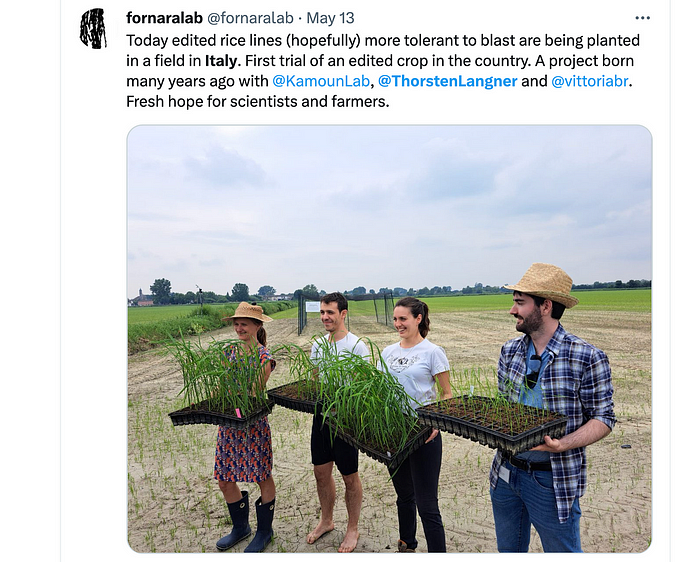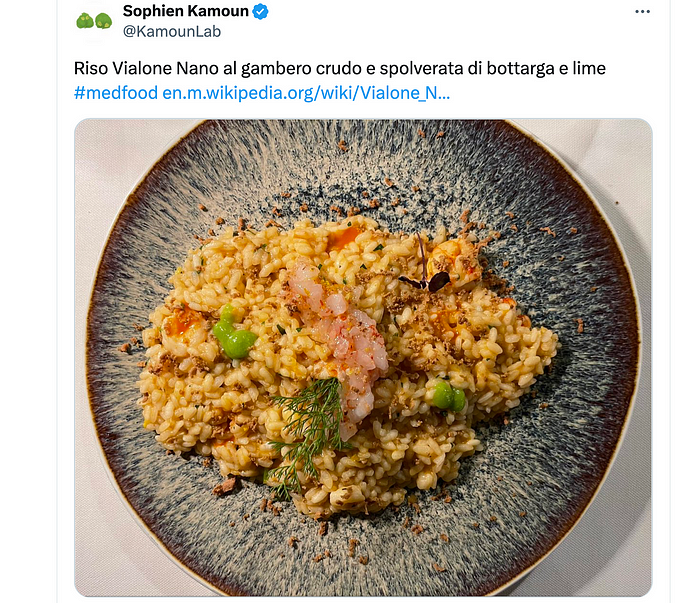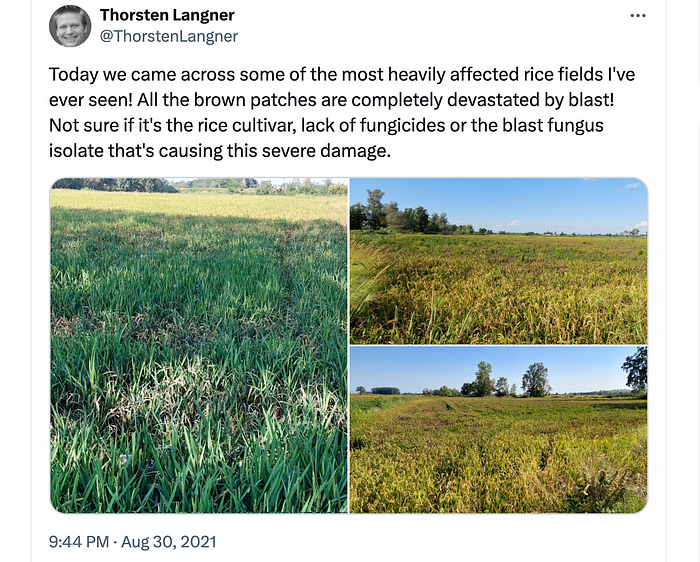Giuseppe Verdi (1813–1901), the prolific composer of Italian opera, frequently explored themes of destruction in his works. His 28 operas often delve into the profound emotional and physical devastations experienced by his characters. Verdi’s focus on devastation came to mind in the last few days as vandals, presumably anti-technology protesters, destroyed Italy’s first field trial of gene-edited (GE) crops on the night of June 21, 2024. Launched on May 18 by our collaborators at the University of Milan, this trial was meant to pave the way for sustainable agriculture. “Distrutto il campo sperimentale di riso RIS8imo,” said the headline. Destroyed!

Qual piuma al vento — Like a feather in the wind
These events also brought to mind Verdi’s most famous aria, and perhaps his most controversial, “La donna è mobile” from the opera “Rigoletto.” Sung by the Duke of Mantua, the aria, which is more like a canzonetta, is cynical and somewhat misogynistic. The Duke uses the aria to express his shallow and hedonistic worldview. “La donna è mobile” highlights his character’s lack of genuine depth, standing in stark contrast to the deeper, more tragic themes explored in the rest of the opera. Verdi’s catchy and upbeat melody underscores the irony and superficiality of the Duke’s sentiments, making it both a memorable and somewhat controversial piece within Verdi’s repertoire.
The irony, of course, is that it is the Duke himself who is “mobile” or fickle, lacking principles and changing tack as the wind blows. “Qual piuma al vento,” as the Duke sings, applies best to himself.
To me, the vandals who destroyed the rice field share the shallow worldview of the Duke of Mantua. Their rejection of new plant breeding technologies, such as Gene Editing, reflects a lack of genuine depth and a knee-jerk rejection of genetic technology no matter what it is, qual piuma al vento. It dismisses the genuine efforts of scientists to address sustainability issues in agriculture. The RIS8imo project aims to combat a serious crop disease — rice blast, generally viewed as the most destructive fungal disease of crop plants — and reduce the overreliance on chemical fungicide treatments to manage the disease.

È menzognero — It’s a lie
What threat does RIS8imo cause to the environment, rice farmers, and risotto enthusiasts?

In Italy, rice blast, locally known as brusone, is managed primarily through the application of a limited number of approved fungicides. RIS8imo is a gene-edited (GE) plant where a few snippets of DNA were removed from a local variety called Telemaco. This isn’t even GMO. In GMO, genes are added to the plant from other sources. Here, it’s the opposite: pieces of DNA were removed. Would you rather eat risotto made from rice grown in paddy fields drenched with fungicides or the more sustainable GE alternative?

I know what the Duke of Mantua would do. He wouldn’t care about the bigger picture. He wouldn’t care that farmers have to spend precious money on chemicals, equipment, and labor to treat their fields. He wouldn’t care about the risks they take by exposure to dangerous chemicals, or the fact that these agrochemicals can leak into the environment. No, the Duke would only view the world from his own perspective with little empathy for farmers, scientists or anyone else for that matter.
Sconcerto e tristezza — Dismay and sadness
Don’t take my word for it. This is what my collaborators Vittoria Brambilla and Fabio Fornara from the University of Milan wrote:
Last night, June 21, a group of eco-terrorists destroyed the experimental rice field inaugurated on May 13 in the province of Pavia. This rice, called RIS8imo, was developed using Assisted Evolution Techniques (TEA) at the University of Milan, with the aim of reducing the use of fungicides in the context of sustainable and high-quality agriculture. The project was hosted in the fields of Dr. Federico Radice Fossati in Mezzana Bigli. The RIS8imo project, conceived by Vittoria Brambilla and Fabio Fornara, had passed all levels of environmental impact assessment by the Ministry of the Environment, the relevant ISPRA commission, and had the explicit and enthusiastic endorsement of the Agriculture Councillor of the Lombardy Region, Dr. Beduschi. The President of the Senate Agriculture Committee, Hon. De Carlo, personally planted one of the seedlings, symbolically opening the doors to an innovation necessary to face the challenges of today’s and tomorrow’s agriculture. Life Senator and pharmacologist Elena Cattaneo wanted to personally attend the planting of RIS8imo, promoting the idea of an alliance between public research, the state, and the entrepreneurial world, aimed at building a future with fewer agrochemicals, better food quality and safety, and greater competitiveness in world markets, as well as protecting a typical product meant to enhance characteristic recipes of national cuisine. As public scientists, we express dismay and sadness at having suffered unjustified violence, a result of obscurantism and anti-scientific tendencies.
Muta d’accento e di pensier — Will they change their words and thoughts
Will they ever change their minds and thoughts, and at least consider a reasonable discussion based on facts and evidence? You would think that those who’ve campaigned against GMO — adding genes to plants — would embrace a GE plant that is is the exact opposite of transgenics or GMO — it has pieces of genes removed from it. Qual piuma al vento. They’re just against everything.
No matter what, violence and destruction are not the answer. This isn’t an opera; farmers’ livelihoods are at stake, and society deserves better than to ignore viable alternatives to agrochemicals. We must prioritize sustainable solutions and support the hard work of the scientists who are striving to create a healthier, more sustainable future for agriculture. Let’s engage in informed, constructive dialogue to ensure that innovations like RIS8imo can be evaluated fairly and implemented wisely for the benefit of all.
Acknowledgements
I thank all the friends and colleagues who expressed support on social media and other platforms. The lyrics of ‘La donna è mobile’ were from Classic FM with minor edits. The article was written with assistance from ChatGPT. The translation of Vittoria and Fabio’s press release was also with ChatGPT.
This article is available on a CC-BY license via Zenodo.
Cite as: Kamoun, S. (2024) Distrutto! Vandals destroy experimental rice field in Italy. Zenodo. https://doi.org/10.5281/zenodo.12510059








